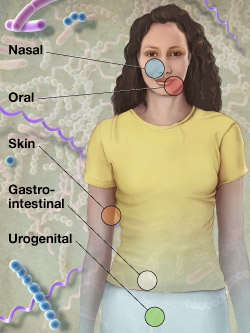Motivation
Microbes (bacteria, archea, viruses and microscopic eukarya) dominate life on earth in absolute numbers, biomass, and diversity of ecosystems. More than half of the Earth's biological history has had only microbial organisms. Microbial physiology is a dominant factor in ecological processes such as carbon cycling, greenhouse gas emission, and oxygen production. In the human body there are ten times more microbial cells than human cells, and there are two orders of magnitude more microbial gene products than human gene products. Over 97% of microbes cannot be cultivated, which has significantly biased existing model systems and microbial genome sequencing. And viruses far outnumber all other life forms. Consequently, we have until recently been unable to appreciate the complexity and function of some of the most important ecological systems on earth.
Fortunately, new sequencing and bioinformatics technologies, such as tagged 16S barcoding, shotgun metagenomics, and community genomics have made it possible to study the structure and dynamics of microbial and viral communities in natural microbiomes. Examples of such "microbiome studies" include:
- Analyses of human microbiomes and the relationships between commensal human microbes and health
- Comprehensive surveys of microbial life in soil, air, and water
- Emprical and theoretical characterizations of the interactions between microbial and macrobiological systems
- Statistical approaches inferring the unseen richness and structure of microbial communities from empirical data
- Analyses of the interactions between microbes at different scales (viral, bacterial, and eukaryotic)
Our objective in this session is to bring together empirical, statistical, and computational scientists in order to catalyze tools to improve microbiome studies.
Session Topics
We invite contributions to microbiome studies that expand our understanding of the composition, structure, and function of microbial ecosystems and their impact on human health and well being. We particularly encourage studies that apply "next generation" sequencing technologies, and reports of tools that support the analysis and sharing of data from such studies. Problems of specific interest may include, but are not limited to:
- Algorithm, statistical, software, and database development for analyzing data from shotgun metagenomics, 16S hypervariable region surveys, and microbial transcriptomics.
- Association studies of microbial consortia with human health, agriculture, bioremediation, climate change, and engineering.
- Theoretical and simulation studies of microbial ecology, function, and evolution.
- The role of microbial consortia in natural ecosystems.
- Interactions among different microbial systems and macrobiological systems
Other topics within the subject area are welcome. Note that all submitted papers should make clear their relevance for the study of Microbiome Studies. If unsure whether your paper fits the session theme, please contact one of the co-chairs.
Session Co-Chairs
Submission Information
Please note that the submitted papers are reviewed and accepted on a competitive basis. At least three reviewers will be assigned to each submitted manuscript.
Important Dates
- Paper submissions due: July 25, 2011 (extension applies to this session only)
- Notification of paper acceptance: September 9, 2011
- Camera-ready final paper deadline: September 23, 2010 at 11:59pm PT
- Abstract deadline for non-reviewed posters: November 28, 2011 at noon PT
Paper Format
Please see the PSB paper format template and instructions at http://psb.stanford.edu/psb-online/psb-submit. The file formats we accept are: postscript (*.ps) and Adobe Acrobat (*.pdf)). Attached files should be named with the last name of the first author (e.g. altman.ps or altman.pdf). Hardcopy submissions or unprocessed TeX or LaTeX files will be rejected without review. Each paper must be accompanied by a cover letter. The cover letter must state the following:
- The email address of the corresponding author.
- The specific PSB session that should review the paper or abstract.
- The submitted paper contains original, unpublished results, and is not currently under consideration elsewhere.
- All co-authors concur with the contents of the paper.
Submitted papers are limited to twelve (12) pages in our publication format. Please format your paper according to instructions found at http://psb.stanford.edu/psb-online/psb-submit/. If figures cannot be easily resized and placed precisely in the text, then it should be clear that with appropriate modifications, the total manuscript length would be within the page limit.
Please note that, unlike many biology conferences, the PSB proceedings is an archival, peer-reviewed publication. PSB publications are indexed in Medline, and should be thought of as short journal articles. Submissions which do not reach this level of publication quality can be disseminated at the meeting through a separate booklet of unrefereed abstracts, and/or by poster presentations.
Contact Russ Altman at psb.hawaii at gmail.com for additional information about paper submission requirements.


